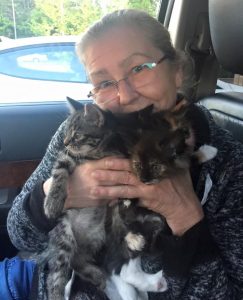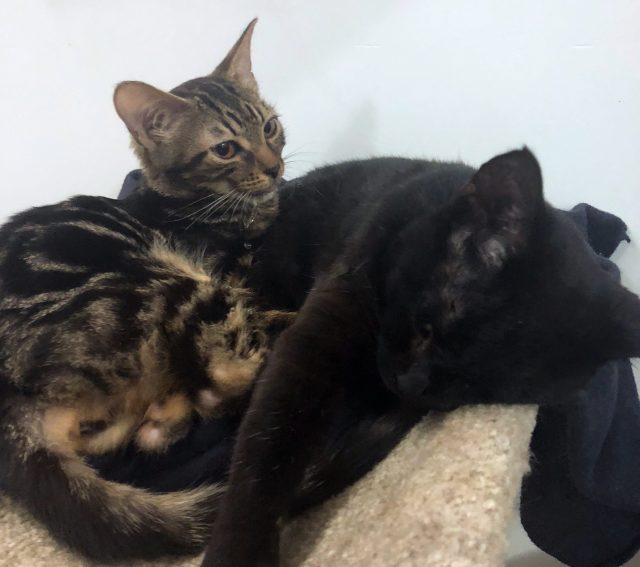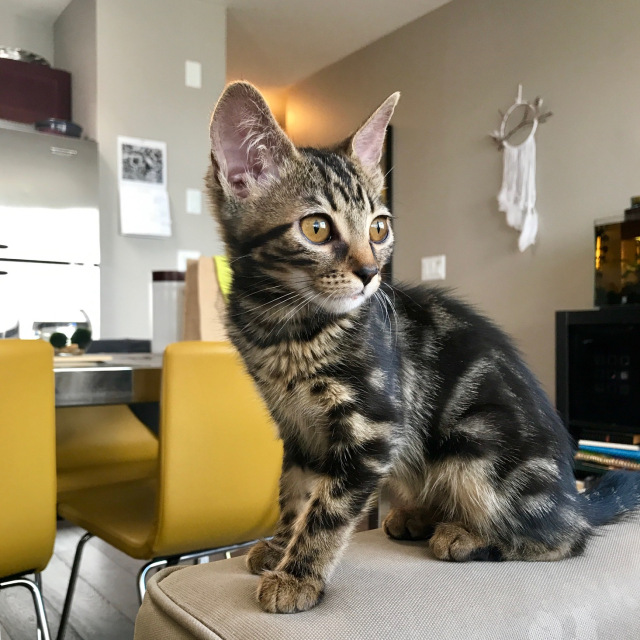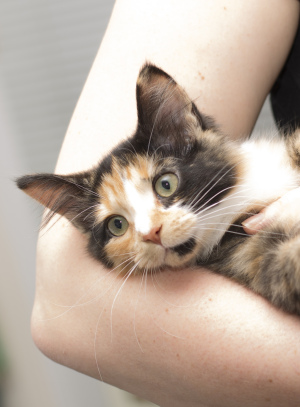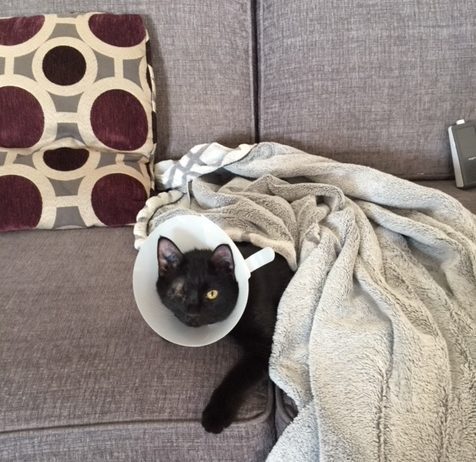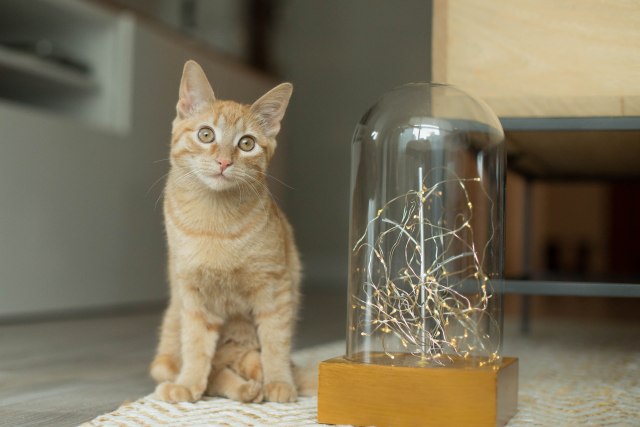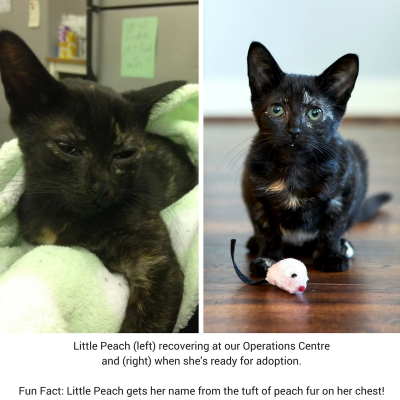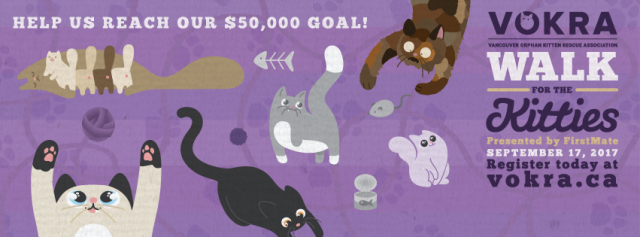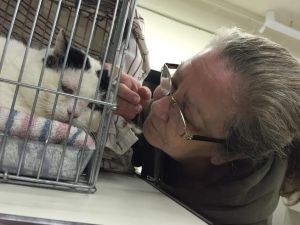 It’s hard to keep track of all the acronyms that exist these days, but in the cat rescue world TNR is a big one. TNR stands for Trap-Neuter-Return and describes the process of trapping feral cats, spaying or neutering them, and then returning them to the location they came from. According to VOKRA co-founder Maria Soroski, it’s the most effective and humane way to help control the feral cat population.
It’s hard to keep track of all the acronyms that exist these days, but in the cat rescue world TNR is a big one. TNR stands for Trap-Neuter-Return and describes the process of trapping feral cats, spaying or neutering them, and then returning them to the location they came from. According to VOKRA co-founder Maria Soroski, it’s the most effective and humane way to help control the feral cat population.
When VOKRA formed back in 2000, Maria had no idea what a feral cat was, which is hard to believe for someone who is such a strong advocate for Vancouver street cats. She, along with fellow co-founder Karen Duncan, began by bottle feeding kittens that had been brought into the SPCA before branching off on their own to create VOKRA.
“I had no idea where the kittens were coming from,” says Maria, who wondered what happened to the kittens’ moms. “I assumed they were from owned cats or that they’d been orphaned.” However, as kittens kept arriving from the same addresses, Maria and Karen started to do a little sleuthing. They soon discovered a whole world of feral cats. The mother cats hadn’t been brought in because they were wild – no one could touch them, let alone pick them up and transport them into care.
Maria discovered entire colonies, some with upwards of 50 cats. They were all the moms, dads, aunts, uncles and cousins of all the bottle-fed kittens that had come in. Thanks to the guidance of local rescuers and the resources of Alley Cat Allies, Maria quickly learned to trap and hasn’t looked back since.
VOKRA’s volunteer trappers, spearheaded by Maria, spent eight years trapping seven days a week in Vancouver and Burnaby. It’s estimated there were more than 8000 – 9000 free roaming cats in Vancouver before VOKRA came along. The number of feral cats is now down to less than 300 with the remaining colonies under control. Some of the colonies now consist solely of senior citizen cats, who pass on humanely after living a life on their own terms.
For cats that we can’t return to their original site, we try and find them another home – specifically a barn or hobby farm. Janet, who coordinates the barn cat placement program, says “It’s an alternative option for feral cats that are unable to be returned to their original location for various reasons.” The barns are located throughout the Lower Mainland, from Abbotsford to Squamish, and Janet often drives the cats to their new homes herself. Potential placements are interviewed in advance and the cats are guaranteed fresh food and water daily, along with a safe shelter area. In their new “jobs” as rodent control technicians they have a better life than they would out on the streets.
If the cats are young enough or semi-tame, then we’ll try to socialize them so we can adopt them to forever homes. “We’re not scared of hissy babies,” says Maria. Armed with gloves, towels, treats, and a whole lot of patient love, VOKRA volunteers socialize kittens in their homes. VOKRA runs workshops and provides coaching to these special families. Fosters tell us this is an immensely rewarding part of being with VOKRA. To watch a kitten or adult cat transform from an untrusting and extremely frightened creature to one that seeks out your affection with headbutts to your hand, and who purrs at the very sound of your voice, is a truly amazing experience.
 We respond to as many calls we can and trap feral cats, tame moms protecting their kittens and tame adults that are too afraid to trust humans just yet. Sometimes this involves all-night efforts and sometimes it involves walking into an abandoned house in protective gear so as not to be eaten alive by the swarms of fleas. Whatever it takes – the fate of all cats is important to us and those who were never given the chance to live a safe, indoor life deserve the best that we can give them.
We respond to as many calls we can and trap feral cats, tame moms protecting their kittens and tame adults that are too afraid to trust humans just yet. Sometimes this involves all-night efforts and sometimes it involves walking into an abandoned house in protective gear so as not to be eaten alive by the swarms of fleas. Whatever it takes – the fate of all cats is important to us and those who were never given the chance to live a safe, indoor life deserve the best that we can give them.
As a non-profit association we rely on the contributions of people like you. If you’d like to support our TNR program click here.
]]>
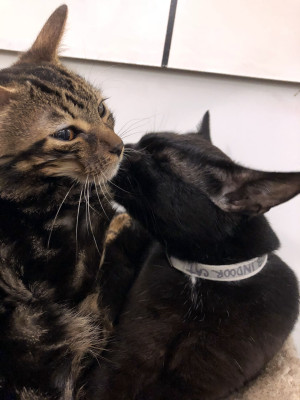 Fall?! Not at our Operations Centre. It’s still springtime at Ops! Spring, the kitten we first told you about last month, has had her ups and down, but the good news is she’s found a special friend.
Fall?! Not at our Operations Centre. It’s still springtime at Ops! Spring, the kitten we first told you about last month, has had her ups and down, but the good news is she’s found a special friend.
Little Spring is still getting her share of human attention, as our staff and volunteers continue to help her with her troublesome kidneys. But now Spring has some kitty love too! Her new ‘bestie’ and health helper is Hamburgler, an eight-year old cat rescued by VOKRA back in June of this year.
Like Spring, Hamburgler had a bit of a rough time before VOKRA came into his life. As one of Vancouver’s many stray cats, Hamburgler was often hungry and sick. When VOKRA volunteers found him, he was crouched under machinery in a shed behind a MacDonald’s restaurant, covered in fleas and with a serious infection in one eye.
Both Spring and Hamburgler ended up at our Ops Centre where they’re getting the care and love they need, and then someone had a bright idea. The health of both cats was stabilizing, but they seemed lonely. Why not room them together?
At first, Spring wasn’t sure what to make of her new stepbrother. But Hamburgler immediately started nudging her to play and soon brought her out of her shell. It wasn’t long before the pair were tossing toys around, touching noses and snuggling up together.
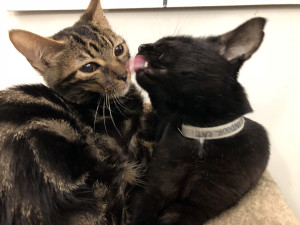 The sight of the happy twosome cuddled on a cat tree is one of the highlights of a shift at Ops for many a volunteer and staff member. The coming months may still bring some cold weather for these kitties. Spring is not entirely well and most recently she took another bad turn requiring yet another emergency trip to the vet. She will be returning for another vet visit soon for an ultrasound as we continue to diagnose her issues. And Hamburgler could have more problems due to his years on the streets. But for now they keep each other warm with the help of everyone at VOKRA and each other.
The sight of the happy twosome cuddled on a cat tree is one of the highlights of a shift at Ops for many a volunteer and staff member. The coming months may still bring some cold weather for these kitties. Spring is not entirely well and most recently she took another bad turn requiring yet another emergency trip to the vet. She will be returning for another vet visit soon for an ultrasound as we continue to diagnose her issues. And Hamburgler could have more problems due to his years on the streets. But for now they keep each other warm with the help of everyone at VOKRA and each other.
Spring and Hamburgler are just two of the thousands of reasons why we Walk for the Kitties.
Each year, VOKRA rescues more than 1,400 homeless cats and kittens from around the Lower Mainland. Unlike many other animal rescue groups, VOKRA is a volunteer-driven, no-kill organization. Our work is made possible through the generous support of volunteers, adopters and people like you.
Medical care accounts for more than 50% of our annual budget. Without your support we wouldn’t be able to afford to rescue all these cats and kittens.
Walk for the Kitties is our largest fundraising event of the year. This 5k fun walk takes place at Jericho Beach and all funds raised go directly towards supporting our rescue efforts. Learn more here.
Can’t make it on September 16? You can still donate today!
]]>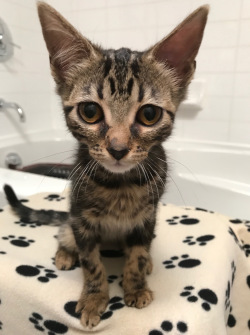 Forget fall; it’s springtime all over again at our Operations Centre. Spring the kitten, that is. This little feline has been getting her fair share of attention here at Ops, with playtime and cuddles galore.
Forget fall; it’s springtime all over again at our Operations Centre. Spring the kitten, that is. This little feline has been getting her fair share of attention here at Ops, with playtime and cuddles galore.
Sweet Spring’s mom was one of the many cats in Vancouver who aren’t spayed or neutered, leading to a lot of unwanted kittens for her owner. VOKRA staff and volunteers helped to spay Spring’s mom, and they’re now working hard to get Spring and her brothers and sisters ready for forever homes.
With her big amber eyes and attractive Bengal-like brown and yellow markings, Spring’s sure to be a hit when it comes time for her to be adopted. But there’s a problem. Spring’s the runt of the litter and she’s been having organ troubles. Her kidneys in particular show some congenital difficulties. Not so long ago, Spring was really nauseated and couldn’t pee or eat. Everyone at Ops spent a lot of time helping with her treatments and giving her some much-needed love.
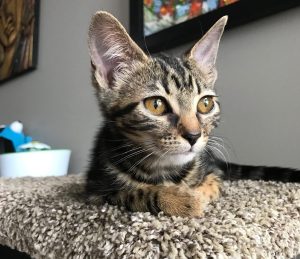 Right now Spring’s back to her regular self. She loves to chase plastic ball toys around her kennel and afterwards scratch her small nails on her cardboard ramp or snuggle up to her many admirers.
Right now Spring’s back to her regular self. She loves to chase plastic ball toys around her kennel and afterwards scratch her small nails on her cardboard ramp or snuggle up to her many admirers.
As a no-kill rescue, our volunteers strive to give a fighting change to every cat, including kittens like Spring, whose health problems could have led to her euthanization at other centres. Everyone at Ops is hoping for a long and happy life for little Spring, with a loving friend to take care of her. There may be some colder weather ahead for this tiny kitten as she may still need some special care. But we’re all in her corner and won’t let her down.
Kittens like Spring are just one of the thousands of reasons why we Walk for the Kitties.
Each year, VOKRA rescues more than 1,400 homeless cats and kittens from around the Lower Mainland. Unlike many other animal rescue groups, VOKRA is a volunteer-driven, no-kill organization. Our work is made possible through the generous support of volunteers, adopters and people like you.
Without your support we wouldn’t be able to afford to rescue all these cats and kittens.
Walk for the Kitties is our largest fundraising event of the year. This 5k fun walk takes place at Jericho Beach and all funds raised go directly towards supporting our rescue efforts. Learn more here.
Can’t make it on September 16? You can still donate today!
]]>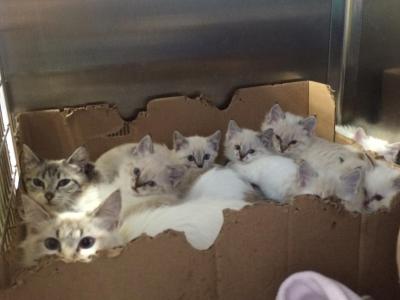
This bunch of semi-feral kittens needed lots of socialization before they were ready for adoption.
Cats and kittens are ready for adoption when they learn to trust and accept us humans. As many of the cats in our care come from the streets they’ve often had limited or negative experiences with people. By caring for them in a stable and safe home environment, our foster moms and dads are helping to charge their view of humans, which is life changing. Fostering allows these cats and kittens to grow and transform into confident kitties who will then find their forever homes.
As each cat or kitten is unique, the way foster parents socialize with them is different. For example, feral or semi-feral kitties see humans as potential predators and so they’ll run away and hide. They may hiss at you when you try to pet them or lash out by swatting or biting. In this situation the caregiver must be slow and patient. You start by sitting wherever they are – close but not too close – and make sure you have some tasty treats. As you have food, they’ll start to associate you with good things. The more they see you as non threatening, the more they’ll warm up to you. Eventually, with patience, love and persistence, an adoptable kitty emerges.
Fostering’s not only a positive experience for the kitties, but also the foster parents! It’s very rewarding to help cats and kittens get adopted. A little time and patience goes a very long way and watching them grow and learn to accept and love humans is an extraordinary feeling. Foster parents not only have immense love for kitties, but also the desire to put time and effort into giving them the best life possible. Unconditional love is given to each cat and that love changes their lives for the better.
Erin, a long time foster parent, shares a memorable story:
“My very first foster turned into my very first foster fail! I took her on while living in Australia. I had some extra time on my hands, so I asked the vet clinic close by if they had a sick or higher-needs cat that needed fostering. They were so happy since they just had a feral kitten brought in. She was extremely hissy and completely terrified of humans, so they needed her to go somewhere else aside from the vet clinic. I brought her home and got her settled into the bathroom. After hiding under the sink in the bathroom for the entire first afternoon through to the night, the next day I went in there to stay with her and do my own thing while being with her. After doing that for the morning, she came out from under the sink, crawled up on my lap, had a bath, curled up on my lap and went to sleep. I knew at that moment that I would not be giving her back at all, ever. The rest is history!
She is very much attached to me (and only me) and not great with other animals. But because of my experience with her we’ve gone on to foster 26 more kittens since then. She was my introduction into fostering and paved the way for all these other kittens to come and be a part of my life. I’m grateful for every day that we have together! And seeing how she has grown from an incredibly hissy and terrified kitten to a much more confident and happy cat, has shown me just what fostering can do for a cat. It is a life changer for them!”
Sarah, a long-term VOKRA foster parent, has fostered two “pee kitties” so far. These are kitties who pee in inappropriate places for seemingly unknown reasons. After checking with a vet to make sure there are no underlying medical issues, she goes through all the other potential reasons, such as stress and anxiety, disapproval of the little box shape or litter type, habits or any other thing she can think of. She notes all the occurrences of inappropriate peeing and the surrounding circumstances to find the patterns and modify the environment as needed. She’s just like a detective!
With one foster, all the kitty required was a larger box with deeper litter. With the other kitty, Zoey, all she needed was to have all enticing soft items, such as towels and bath mats, off the floor so the only target for pee was the litter box. All these “pee kitties” simply needed was a person with the patience to understand what they want and the willingness to create a consistent environment for them.
Sarah weighs in on why being a foster parent is an amazing opportunity:
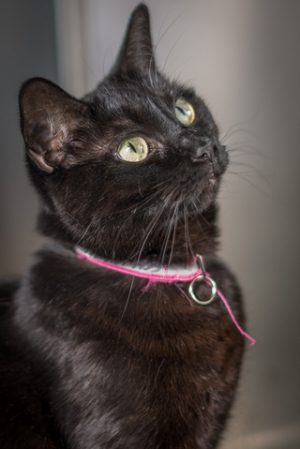
Ziggy’s one of Sarah’s former “pee kitties”. Happily she was recently adopted and now has a new forever home.
“I started fostering when I was living on my own after having moved to Vancouver by myself. I grew up with cats and adding a cat to my home seemed like a no brainer! However, as a student, I was unsure about my long-term plans so fostering allowed me to have a furry companion without committing before I was ready. It’s also so rewarding to see them improve and go off to new homes with excited new owners! And, of course, I feel like I’m helping with the larger problem of cat overpopulation and reducing strain on VOKRA as a rescue organization so that their main focus can be on those cats with greater medical needs while healthy kitties can enjoy the comfort of a home rather than a shelter environment. It also allows me to help teach others about the importance of fostering and how much fun it is!”
Fostering saves lives and we have more than 350 foster parents to thank for that! Many of our kitties need to socialize with humans and learn to accept them before being adopted and our foster homes offer the best opportunity for them get the fresh start they need. One at a time, fostering produces a transformed, adoptable kitty ready to find a loving furever home!
At VOKRA we’re always looking for new foster parents to help save more lives. We provide all the food, supplies and other equipment necessary to our foster homes, as well as ongoing support and advice. You simply provide the care, attention and love.
We have a variety of fostering situations as we take in orphaned kittens, feral kittens, pregnant mothers, mothers with kittens and adult cats. Each year we need temporary homes for more than 1,400 kittens and cats! If you’re interested in learning more about fostering, please visit our website at vokra.ca/fostering.
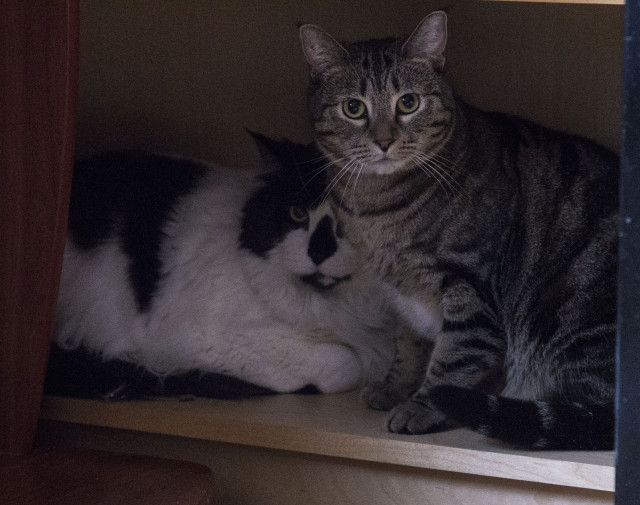
Raindrop and Steveston each grew up in difficult circumstances and came to us as semi-feral cats two years ago. They met in foster care where they became fast friends and are a great comfort to each other. They’re both still very shy, but we’re hoping an accepting and patient adopter will come along and open their heart and home to them.
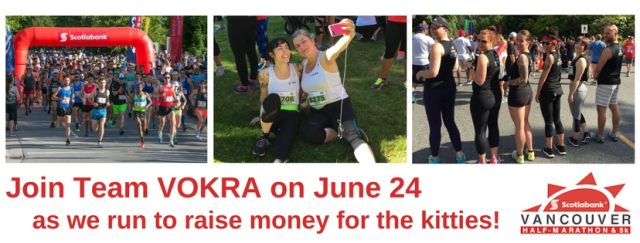
On June 24, Team VOKRA will be participating in the Scotiabank Half-Marathon and 5k run/walk and we want you to join us. It might not change your life, but your support will definitely help change the lives of the more than 1,400 kitties we rescue each year.
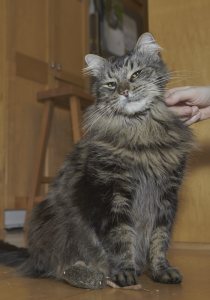 Kitties like Timmy, a handsome gentleman cat who came to VOKRA way back in 2012 after being rescued from a shelter. Timmy’s diabetic which means he needs a shot of insulin twice a day to stay healthy. It’s very difficult to find someone willing to take on a kitty with health issues, so at some shelters cats like Timmy are often deemed “unadoptable” and end up being euthanized. At VOKRA, they believe every kitty deserves a chance at a happy, healthy life so Timmy will stay with them for as long as it takes for him to find the purrfect forever home.
Kitties like Timmy, a handsome gentleman cat who came to VOKRA way back in 2012 after being rescued from a shelter. Timmy’s diabetic which means he needs a shot of insulin twice a day to stay healthy. It’s very difficult to find someone willing to take on a kitty with health issues, so at some shelters cats like Timmy are often deemed “unadoptable” and end up being euthanized. At VOKRA, they believe every kitty deserves a chance at a happy, healthy life so Timmy will stay with them for as long as it takes for him to find the purrfect forever home.
Whether they’re kittens or adults, feral or tame, healthy or sick – VOKRA provides them all with the best care we can. But this does come at a cost.
You don’t have to be an athlete to join. And few on our team have ever fundraised before either (you only need to commit to raising a minimum of $50). All you need is a love of cats. This love is what unites us as a team and carries us all over the finish line!
It’s super easy to get started. To join Team VOKRA simply click here to register. And, as a bonus, each team member is entitled to a special preferred rate. To get the preferred rate be sure to enter one of the following PIN codes:
Half-Marathon discount code: 18VOKRA21K
5K discount code: 18VOKRA5K
Once you’re registered you’ll receive a link to your personal fundraising page so you can get started right away. And to help ensure you achieve your goal, Team VOKRA will provide you with a motivational emails to help you fundraise. We’ll also invite you to join the Team VOKRA Facebook group so you can connect with your fellow team members. So there’s no excuses! Sign up today and join Team VOKRA!
Be sure to reserve your Team VOKRA spot as soon as possible so you don’t miss out!
Don’t want to run? You can still help when you sponsor Team VOKRA today!
]]>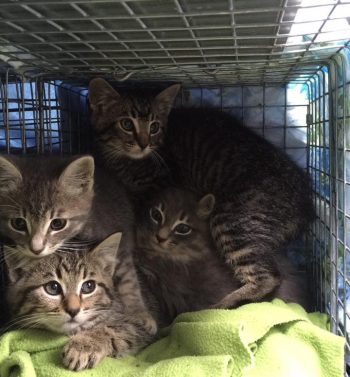 At VOKRA our mission is to end cat overpopulation and homelessness. One of the ways we’re helping accomplish this is through to Trap-Neuter-Return (TNR), the process of trapping feral cats, spaying or neutering them, and then returning them to the location they came from. We’ve seen a lot of success with TNR, but much of our time is actually spent on trapping tame strays. Trapping these cats and kittens is the first step towards finding them their furever homes.
At VOKRA our mission is to end cat overpopulation and homelessness. One of the ways we’re helping accomplish this is through to Trap-Neuter-Return (TNR), the process of trapping feral cats, spaying or neutering them, and then returning them to the location they came from. We’ve seen a lot of success with TNR, but much of our time is actually spent on trapping tame strays. Trapping these cats and kittens is the first step towards finding them their furever homes.
When we receive information about a stray cat, we find out as much information as we can to help us determine the best way to trap. We take into account how long the cat(s) has been hanging around and their lingering behaviour – are they coming at a specific time or are they around all the time? It’s important to know if they’re being fed or eating as well. Getting to know as much about the cats as possible is key to making a quick and successful trap. Behaviours such as skittishness or curiosity help us determine the correct method.
At times, it’s as easy as coaxing the cat into a carrier. Other times, setting up a trap is the only way. Traps are usually set up where the cat is being fed and include fresh tuna at the back of the trap. With feral cats, they’re taken to the vet for sedation and spay/neuter, vaccinations, ear and dental cleaning and flea treatment. They recover at our Operations Centre and are then taken back to their original location. The individual who called about the cat will be provided with food and any follow-up care. With tame cats, after they’re trapped they’re taken to our Operations Centre where we check for a microchip or tattoo. We deflea, deworm and vaccinate these kitties and have blood tests, urinalysis and teeth cleaning completed if they’re more than five years old. These tame cats are then ready for a foster home and, when they’re ready, will go up for adoption.
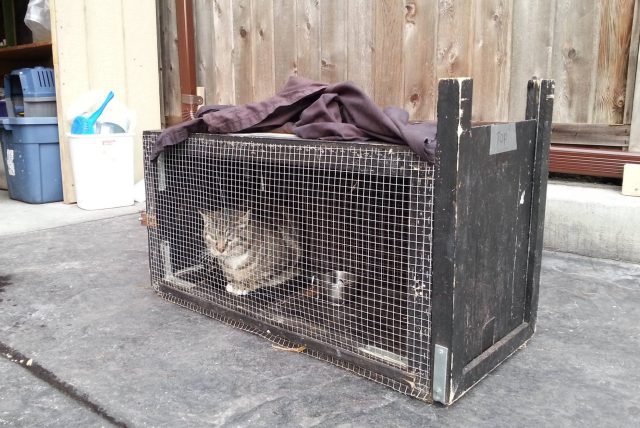
This is “Woody”, trapper Janet Cox‘s trusty wooden trap. She uses it to trap kitties who refuse to go into a metal trap. It always works like a charm!
It may seem feral cats could be more problematic than tame strays, but it’s just as important to trap these tame cats. Owned cats get lost and abandoned, which is a painful situation. If they aren’t fixed, they breed and female cats will usually give birth to their kittens outside or under garages, or amongst junk in a yard. These kittens will then grow up unsocialized by humans and grow into feral cats. If these kittens are also not spay/neutered, the cycle repeats itself and soon a feral colony will be formed. This is why it’s important for cat owners to spay and neuter their cats by five months old, and for the public to call us if they suspect a tame or feral stray who hasn’t been fixed is lingering around their neighbourhood.
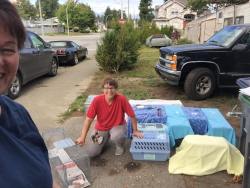
Dedicated Surrey volunteers and trappers, Anne Salomon and Mona Boucher know all the tricks to trapping.
Sometimes, our trappings don’t go as planned, as explained here by VOKRA co-founder and trapper extraordinaire Maria Soroski:
“I was called out to an industrial area in Burnaby because the business said they heard meowing coming from under the floorboards of the trailer on their property,” said Maria. “Since I couldn’t remove the floorboards, I crawled under the trailer to where they pinpointed they heard the kittens. When I found the area above me between the floorboards, I heard the noise – they were baby raccoons! I got out of there as soon as possible before the mama raccoon got mad.”
After trapping for 17 years and counting, Maria’s has countless stories. Here’s one of her most memorable ones (for cats, not racoons!):
“At least twelve years ago, I went to a location in East Vancouver where there were three adult feral cats, two female and one male, and a litter of five kittens that were eight weeks old,” explains Maria. “It was January, bitter cold that night with snow that had fallen on the ground. I set traps by the back lane garage for the kittens first and waited in my car to keep warm. Two kittens went in the traps immediately and as I was carrying the two traps to my car, I was suddenly surrounded by the adult cats. They were hissing so I ran as fast as I could to my car with the kittens in the traps while they chased me. I waited in my car again until the remaining kittens went into the traps. The three adult cats were waiting by my car, so I quickly opened the door and ran to the last traps. As I was bending down to pick up the traps, the two adult females jumped onto my back, growling and swatting. I managed to get them off me and got all the traps to my car. The adults were jumping up at my window, so I threw an open can of cat food onto the grass, started the car and drove off as they ran behind my car.”
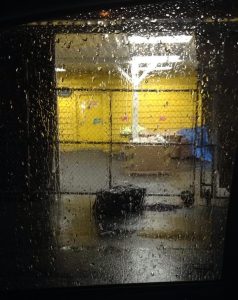
5:30 a.m. – Maria’s view as she waits patiently for some kittens, who were dumped in a back alley. to decide to go into the trap.
“I’ve never had this happen to me again, but I felt so bad for the cats as they saw their babies be driven away,” continues Maria. “The next night, I went and set traps for all three of the adult cats and took them to the vet for spaying and neutering. They stayed a couple days with us to recover and I let them see the kittens. It seemed to calm them down, knowing I didn’t cook their babies for dinner. The feral adults were returned to their original location and taken care of outside by the person who called us.”
Trapping isn’t an easy job, as we can all now see. It requires dedication and commitment to VOKRA’s mission. The trapping of tame strays is especially important as they have socialized with humans before, making them adoptable into a furever home. However, furever homes can’t exist if we don’t have pet-friendly housing. Global BC covers the issue here, making it clear our housing issues are a big cause for the loss of homes and families for too many pets. Sign the Pets OK BC petition here to help make a difference. Our trapping efforts are rendered useless if these kitties have less and less places to go once they’re ready for adoption.
Thank you to all our volunteer trappers who spend hours and hours watching over traps – be it sunshine or rain, day or night. Due to your efforts thousands of kitties have been taken off the streets and now have homes to call their own!
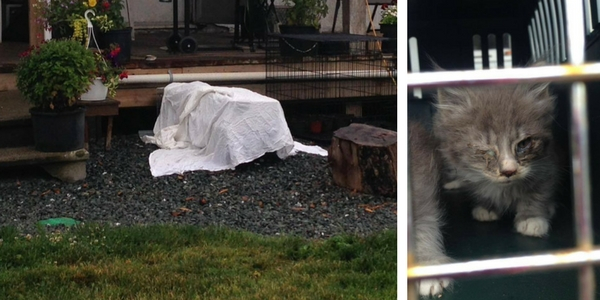
A mama and four kittens were trapped from under this porch. All the kittens had eye infections, but it was their lucky day. They were transferred to our Operations Centre for assessment and then onto foster care where they received daily treatment. Today mom and kittens are all healthy and have been adopted into loving homes.
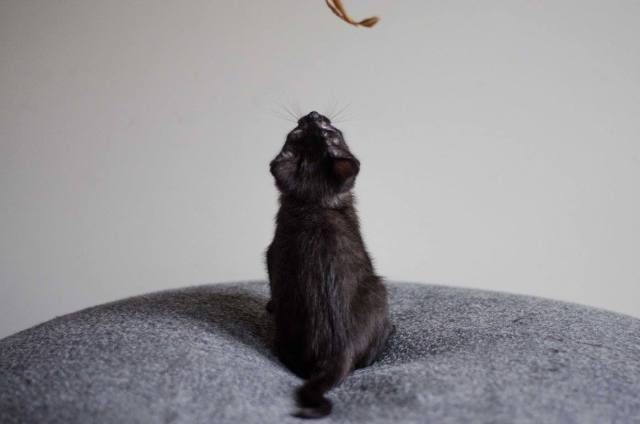
Every day the dedicated volunteers of VOKRA go to great lengths to save the lives of homeless cats and kittens from around the Lower Mainland. Little Hazel is one such kitten who may not be here today were it not for our care.
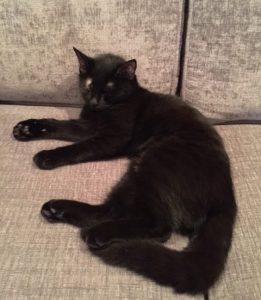 Hazel was born to a semi-feral mom who had recently been brought in to our Operations Centre. Not only was she the smallest kitten in the litter, she was born with one eye swollen shut. It turned out poor Hazel was born with an eye infection, resulting in ongoing issues with pain and poor vision in her eye.
Hazel was born to a semi-feral mom who had recently been brought in to our Operations Centre. Not only was she the smallest kitten in the litter, she was born with one eye swollen shut. It turned out poor Hazel was born with an eye infection, resulting in ongoing issues with pain and poor vision in her eye.
Hazel didn’t let her vision limitations slow her down though. She played, tumbled and chased her siblings around just like any other kitten. During one particularly active play session, Hazel’s weak eye was damaged and she was rushed to an emergency vet. It was discovered her weak eye was acting as a foreign body and had no chance of recovery, so it would eventually need to be removed.
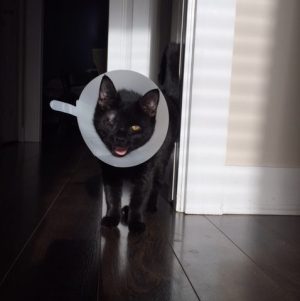 As the months passed by, all Hazel’s brothers and sisters were adopted while Hazel struggled with recurring infections, leading to her eye being removed at four months old. Unfortunately, her health problems continued and she returned for a second surgery.
As the months passed by, all Hazel’s brothers and sisters were adopted while Hazel struggled with recurring infections, leading to her eye being removed at four months old. Unfortunately, her health problems continued and she returned for a second surgery.
After two surgeries, two dewormings, four rounds of antibiotics and many more vet trips, Hazel continues to be a loving, intelligent, playful and overall adorable little ball of fluff. She’s so resilient that even two months of living with a cone around her head hasn’t slowed her down.
Happily Hazel will be available for adoption in the coming weeks. She’s a spirited little trooper who will be make some lucky family very happy. If you have room in your heart and home for little Hazel, keep an eye out for her on our ready-to-adopt page.
And if you’d like to help us pay for Hazel’s medical treatment, as well as the veterinary cost for all the other special kitties in our care, you can donate today at givetovokra.ca.
]]>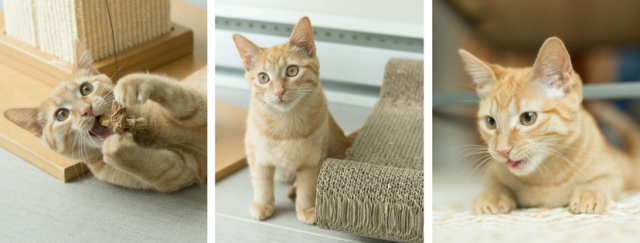
Lt. Dan is one feisty young lady. Yes, we said lady.
She was born with twisted back legs, and with everyone thinking she was a boy. But in true kitten fashion, she doesn’t let any of this slow her down one bit!
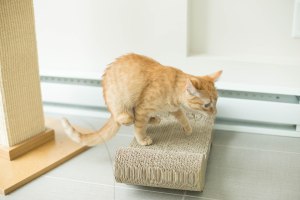
Here you get a good look at Lt. Dan’s back legs. But, as you can see, she has no problem hopping up!
Lt. Dan came to VOKRA with her mom and three siblings after they were discovered living in a barn. We immediately noticed the problem with her legs, but it wasn’t immediately apparent she was a girl (even after her first vet check up!). So she was loving dubbed Lt. Dan, from Forest Gump fame, and the name stuck.
Recently, Lt. Dan went back to the vet for a consultation and, low and behold, it was discovered she’s a she! The vet has also determined Dan’s hamstrings are contracted, likely due to the way she was positioned in the womb, and she’d benefit from exercises to stretch her muscles. As she grows, we’ll keep a close eye on her to determine whether acupuncture or surgery will help.
The reality is only 25% of kittens who don’t receive human care survive and Lt. Dan is a purrfect example of a kitten who wouldn’t make it on the streets. Unlike many other animal rescue groups, VOKRA is a no-kill organization. This means we will always provide kittens like Lt. Dan with a chance at a happy life.
Your support today will help pay for the cost of caring for all the special cats and kittens, like Lt. Dan, who come through our doors each year. Including veterinary care, medication, food and litter.
This holiday season, please give to help care for kittens like Lt. Dan.
P.S. – By becoming a monthly donor you can show your support for the kittens all year long! Just $10 pays for one kitten to be vaccinated each month, while $45 pays the monthly cost of feeding a kitten.
A big THANK YOU to @wagntrailsvancity for all these great pics of Lt. Dan!
]]>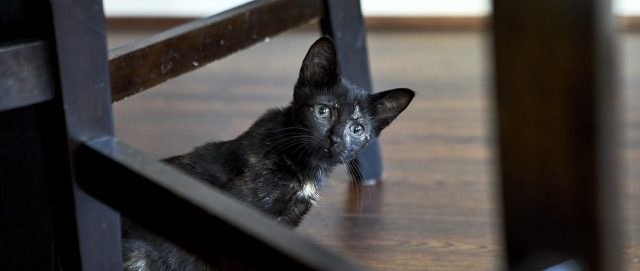
Little Peach was the tiniest of her litter and she was born with a very damaged liver.
After many trips to the vet, medication and a change in diet, she began to heal, but she’s been left with impaired vision and some mental challenges.
At VOKRA we strongly believe every kitty deserves to have a good life and Little Peach is no exception. She and her five siblings were born on the streets and if she would have stayed there she surely would have died.
The sad reality is only 25% of kittens who don’t receive human care survive. As a volunteer-driven non-profit, we wouldn’t be able to help kittens like Little Peach without your support.
Kittens in our care have a chance at a happy, safe and healthy life. Today, Little Peach lives in a loving home where she’s made new friends with the two residents cats and a dog. She couldn’t be happier!
Your support today will help pay for the cost of rescuing more than 900 kittens each year, including veterinary care, medication, food and litter.
This holiday season, please give to help save kittens like Little Peach.
P.S. – By becoming a monthly donor you can show your support for VOKRA all year long. Just $10 pays for one kitten to be vaccinated each month and $25 pays for a flat of canned food.
A special thank you to Angela McConnell for Little Peach’s portraits!
]]>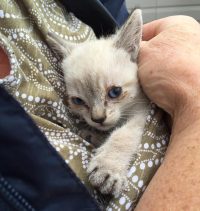
Finn when she first arrived
Finn was trapped along with her mom Pumpkin and brother Henry at a trailer park in Langley. She arrived at VOKRA covered in fleas and with an infection that made her eyes all gooby. It was also immediately evident something was wrong with her back legs. We suspected she had swimmer syndrome, a developmental abnormality making her unable to stand.
Always a little trooper, Finn wouldn’t let her disability get in her way and would wiggle herself around our Operations Centre looking for cuddles, which, or course, she’d always get!
After several different vet visits, Finn was diagnosed with a spinal issue and it was discovered her right hind leg is significantly shorter than her left. To top it off, because she’s semi-incontinent she’s had to battle several urinary tract infections (UTIs), which isn’t uncommon for kitties with her condition. So today Finn lives with foster mom Corin and gets regular physiotherapy to help her get stronger so she can stand in her litter box and hopefully avoid future UTIs.
Finn gets regular hydrotherapy in the bathtub where she can now stand and take some steps. Corin also does both seated and standing passive manipulation with her to help train her muscles and Finn has some supports she uses to help her get around.
“Finn’s very clever and has figured our how to do pretty much everything without walking like other kitties,” said foster mom Corin. “She’s incredibly intelligent and only needs to see the other kitties in our home do something once and she mimics it.”
Along with her increased strength Finn’s litter box habits are improving so she’s currently UTI-free. If she can remain this way, she’ll head back to the vet to be spayed and will have additionally imaging done to better diagnose her issues. Then she’ll be able to start professional physiotherapy and even perhaps acupuncture.
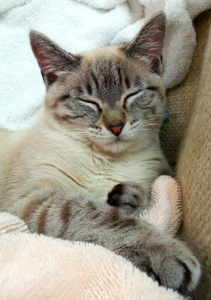 The reality is only 25% of kittens who don’t receive human care survive. It’s a certainty Finn would not be alive today without help. Unlike many other animal rescue groups, VOKRA is a no-kill organization. This means we will always provide kittens like Finn with a chance at a happy life, no matter the cost.
The reality is only 25% of kittens who don’t receive human care survive. It’s a certainty Finn would not be alive today without help. Unlike many other animal rescue groups, VOKRA is a no-kill organization. This means we will always provide kittens like Finn with a chance at a happy life, no matter the cost.
“An empty lap is an invitation and Finn will fill it in seconds,” said Corin. “But behind those snuggles is a bit of a Rambo kitty. She fears nothing, not even the vaccum!”
Finn is just one of the thousands of reasons why we Walk for the Kitties.
Each year, VOKRA rescues more than 1,400 homeless cats and kittens from around the Lower Mainland. We’re volunteer-driven and our work is made possible through the generous support of people like you – our volunteers, adopters and donors. Walk for the Kitties is our largest fundraising event of the year and we rely on the funds raised to help pay for all the things like food, litter and veterinary care our kitties need.
Can’t make it on September 17? You can still help when you donate today!
You can also follow Finn’s adventures on her Instagram account at @felinefinntastic
]]>